The Best Over-the-Counter Hearing Aids of 2025
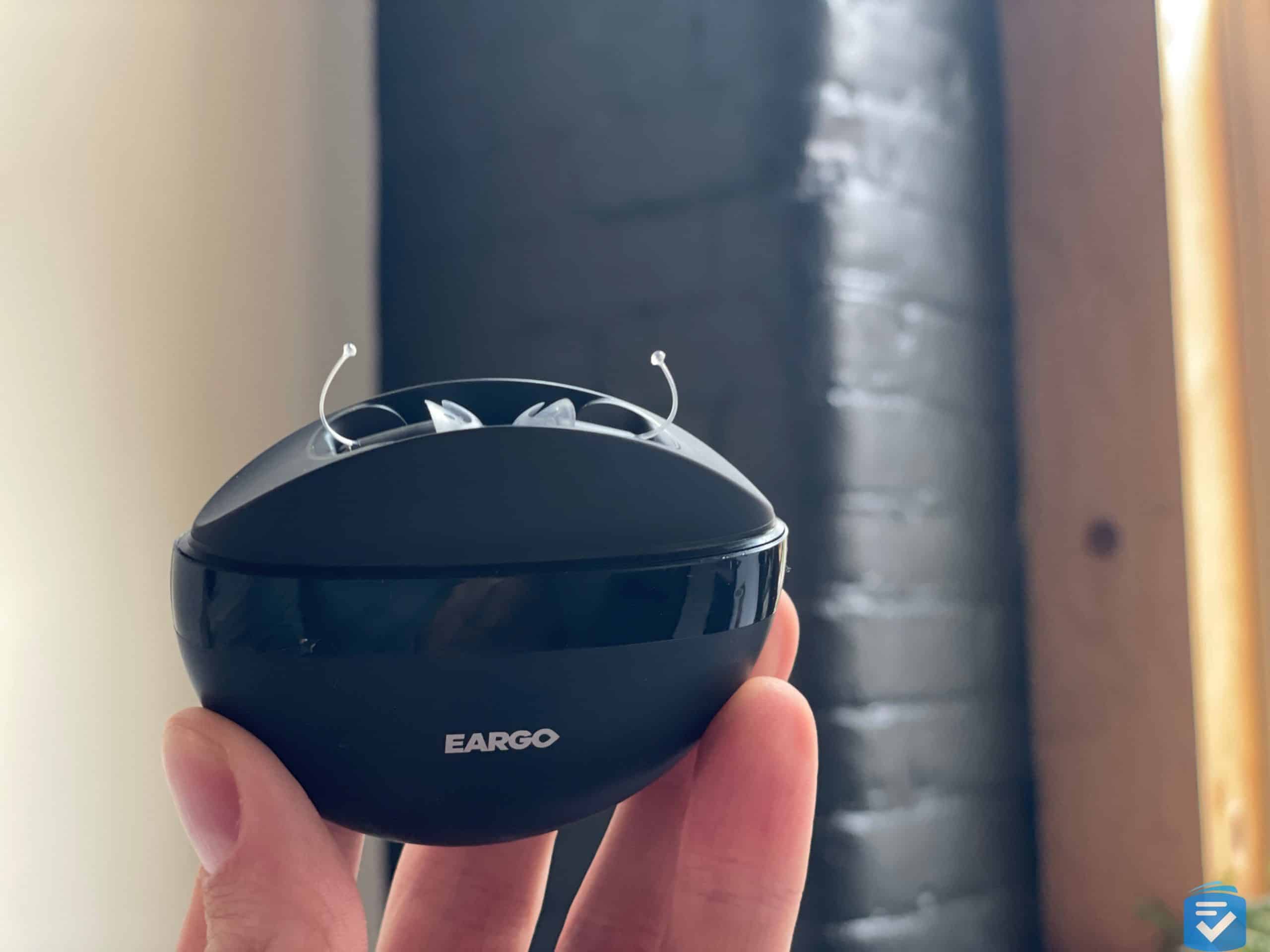
Looking for affordable hearing solutions without the hassle of prescriptions? While prescription hearing aids can cost an average of $4,600 a pair, OTC options could dramatically reduce costs.1 They’ve revolutionized accessibility for those with mild to moderate hearing loss. Our extensive testing revealed impressive advancements in 2025’s top models, with devices like Jabra Enhance offering Bluetooth streaming and remote adjustments for just $995.
As caregivers and hearing aid experts with decades of combined experience, we’ve rigorously evaluated each device based on sound quality, battery life, comfort, and customer support. Whether you prioritize discretion, affordability, or premium sound, our comprehensive guide helps you find the perfect OTC hearing aid for your unique needs.
Pro Tip: If you want in-person support from audiologists, then you should also check out our list of the best hearing aids overall, which includes top prescription brands.
Best Over-the-Counter (OTC) Hearing Aids
- Enhance Select 50R : Best Overall OTC Hearing Aid
- Eargo SE : Most Discreet Hearing Aid
- MDHearing VOLT MAX : Most Affordable OTC Hearing Aid
- Lexie B2 Plus : Bose Sound Quality
- Otofonix Revive : Best Bluetooth Capabilities
The Best OTC Hearing Aids
Enhance Select 50R - Best Overall OTC Hearing Aid
 View Packages
Links to Jabra Enhance
View Packages
Links to Jabra Enhance
What We Like Most:
- Personal support from trained audiologists
- Small, lightweight, and easy to wear
- Adjustable settings via the Jabra app
- Option of rechargeable or disposable batteries

Overview
Cost: $995 per pair
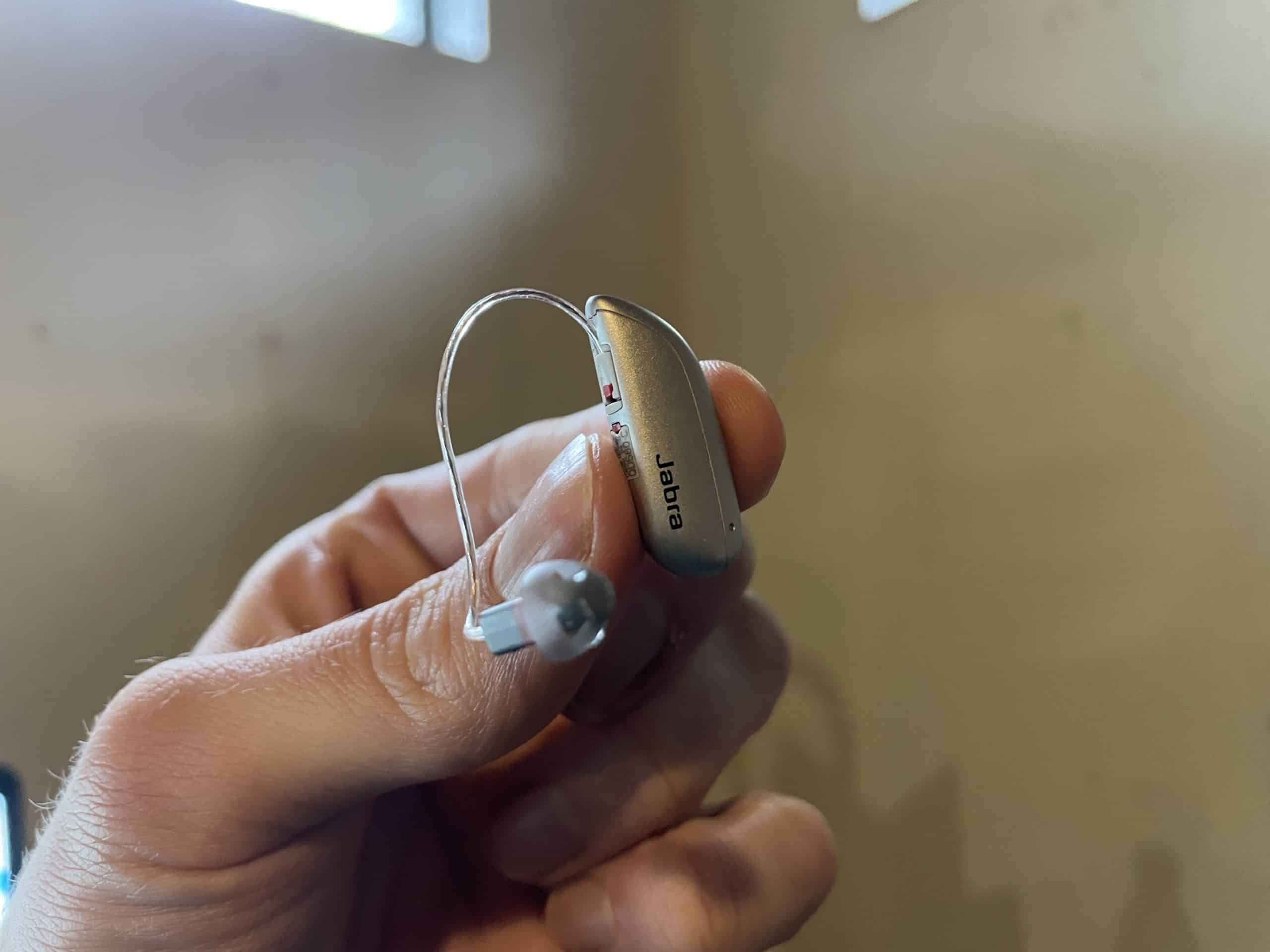
The Jabra Enhance Select 50R is one of our favorite OTC hearing aids due to its advanced technology, stellar customer support, and affordable price point. When you purchase a Jabra Enhance Select 50R, you’ll receive custom-fit hearing aids without visiting an audiologist.
The Jabra Enhance Select 50R can reduce background noise and prioritize voices, making it easy to carry on conversations in any environment, no matter how noisy. With the Jabra smartphone app, you can meet with the Jabra audiology team remotely to make adjustments as necessary. This can be done through phone or video calls.
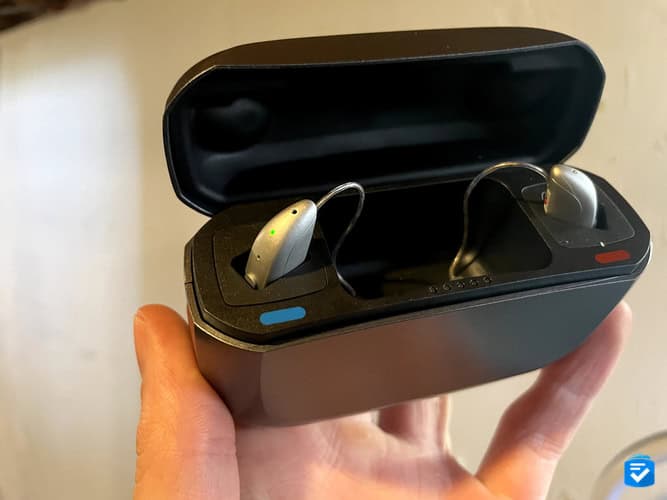
Additionally, with this hearing aid’s Bluetooth capabilities, you can take phone calls and listen to music directly through your hearing aids. In our experience, the sound quality of the Bluetooth streaming is superb.
In terms of pricing, Jabra Enhance Select 50R comes in two packages: Basic and Premium. The Basic package comes with limited customer support and a one-year warranty. The Premium package, however, comes with three years of support from Jabra hearing specialists, as well as a three-year warranty. In our experience, the Jabra hearing specialists are incredibly helpful, and they can help fit your hearing aids remotely.
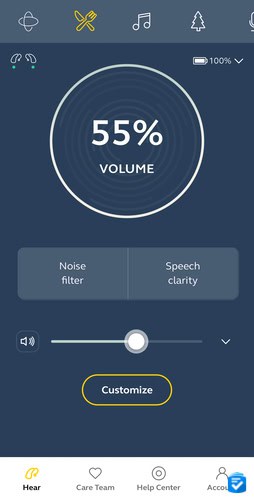
To learn more about Jabra’s hearing aid models and our experience using them, read our Jabra hearing aids review and guide to Jabra hearing aids costs.
Pros
- Easy and comfortable to wear
- High-quality sound
- Ongoing support from hearing professionals
- Easy-to-adjust settings
- Bluetooth compatible
- Rechargeable options
Cons
- Extra costs for professional support
- No invisible models
Eargo SE - Most Discreet Hearing Aid
What We Like Most:
- Rechargeable batteries
- Virtually invisible, completely-in-canal design
- Lifetime licensed support
- Automatic sound adjustments
Overview
Cost: $1,699 for a pair
Eargo offers tiny, discreet hearing aids that fit comfortably inside the ear canal. In addition to their stellar audio quality, Eargo hearing aids come with a 45-day trial period, so you can try them before finalizing your purchase. What’s more, you can download Eargo’s free mobile app to tailor your hearing aids to your preferences.

Our favorite OTC model from Eargo, the Eargo SE, builds on the company’s successful formula with advanced audio technology. We could adjust the sound via four presets or total customization in the Eargo app, making sure we could hear clearly both in one-on-one conversations and in noisy restaurants. Additionally, this model has a rechargeable case that holds up to five charges, each of which lasts for up to 16 hours.
An Eargo SE purchase comes with lifetime remote support from audiologists and hearing health professionals. If your hearing aids get damaged, they’ll be covered by Eargo’s one-year warranty. However, if you want to extend that warranty to two years, you can buy Eargo Care for $300. It will also get you dedicated customer support and a private education session on how to best use your hearing aids.
For a more in-depth look at the Eargo SE, check out my full Eargo review. You can also learn more about the company’s other models in my rundown of Eargo hearing devices.
Pros
- Nearly invisible design
- Lightweight and comfortable
- Stellar sound quality
- Attentive customer service
- Secure, completely-in-canal fit
- Free mobile app for personalizing hearing aids
- Lifetime support from licensed hearing professionals
Cons
- Suitable only for mild to moderate hearing loss
- No personalized or in-person fittings
- Not dust-tight or waterproof
MDHearing VOLT MAX - Most Affordable OTC Hearing Aid
What We Like Most:
- Noise-reduction technology
- Full money-back guarantee
- 45-day trial
- Under $600 for a pair
Overview
Cost: $597 per pair
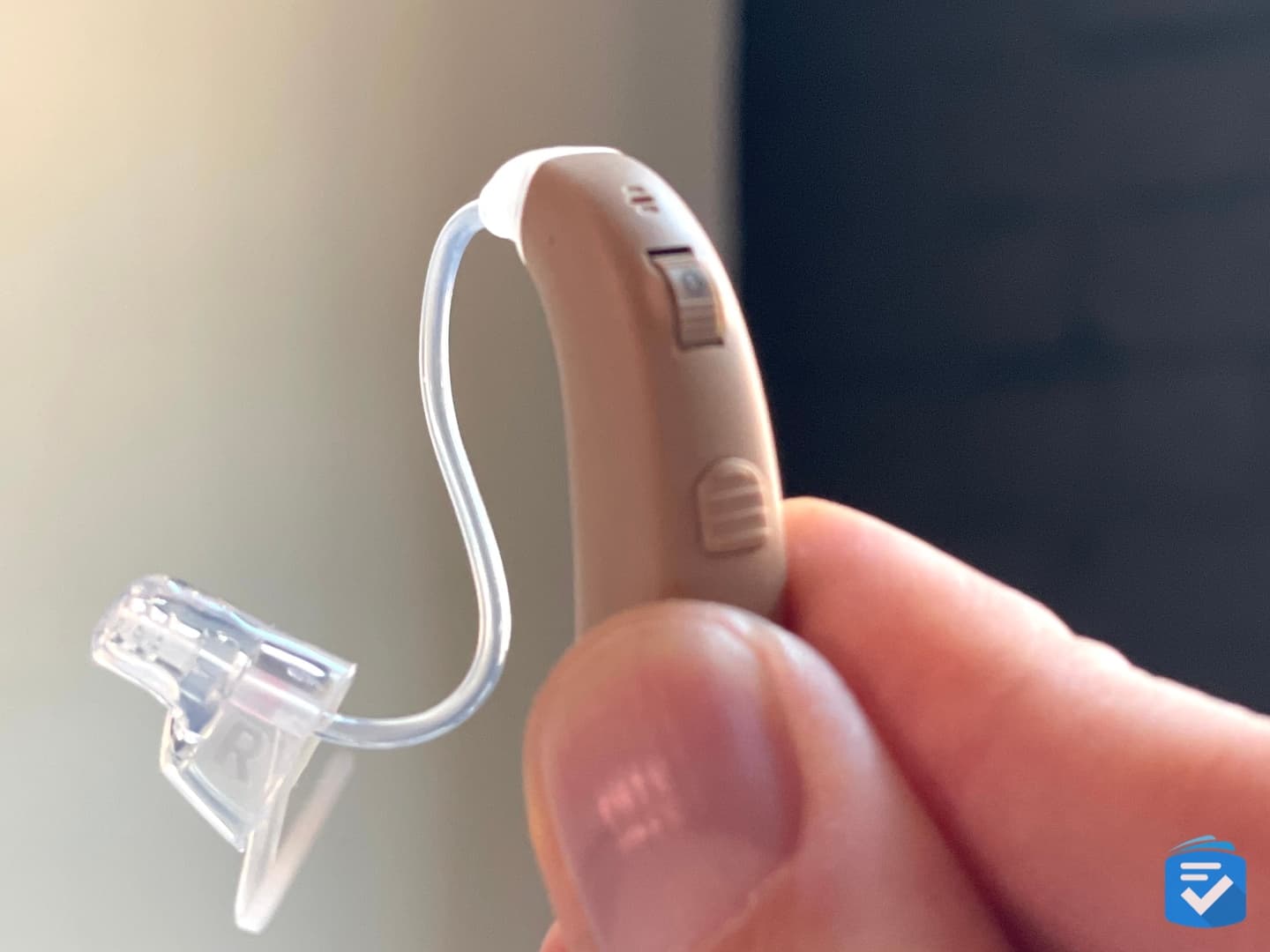
MDHearing offers a variety of affordable behind-the-ear hearing devices. Its most advanced model, the MDHearing VOLT MAX, boasts premium features such as smartphone compatibility, long-lasting rechargeable batteries, audio customization, and noise management.
Powered by a portable charging case with no batteries needed, the MDHearing VOLT excels with smart features. By connecting to your smartphone via Bluetooth, the VOLT can be remotely adjusted. Through its app, you can adjust noise reduction and the overall equalizer settings on your hearing aids, and they will automatically sense noise levels in your environment and adjust accordingly.
The 45-day trial period is not as long as that of other hearing aid brands, but its low price point makes it a compelling buy. The VOLT also comes with a one-year warranty.
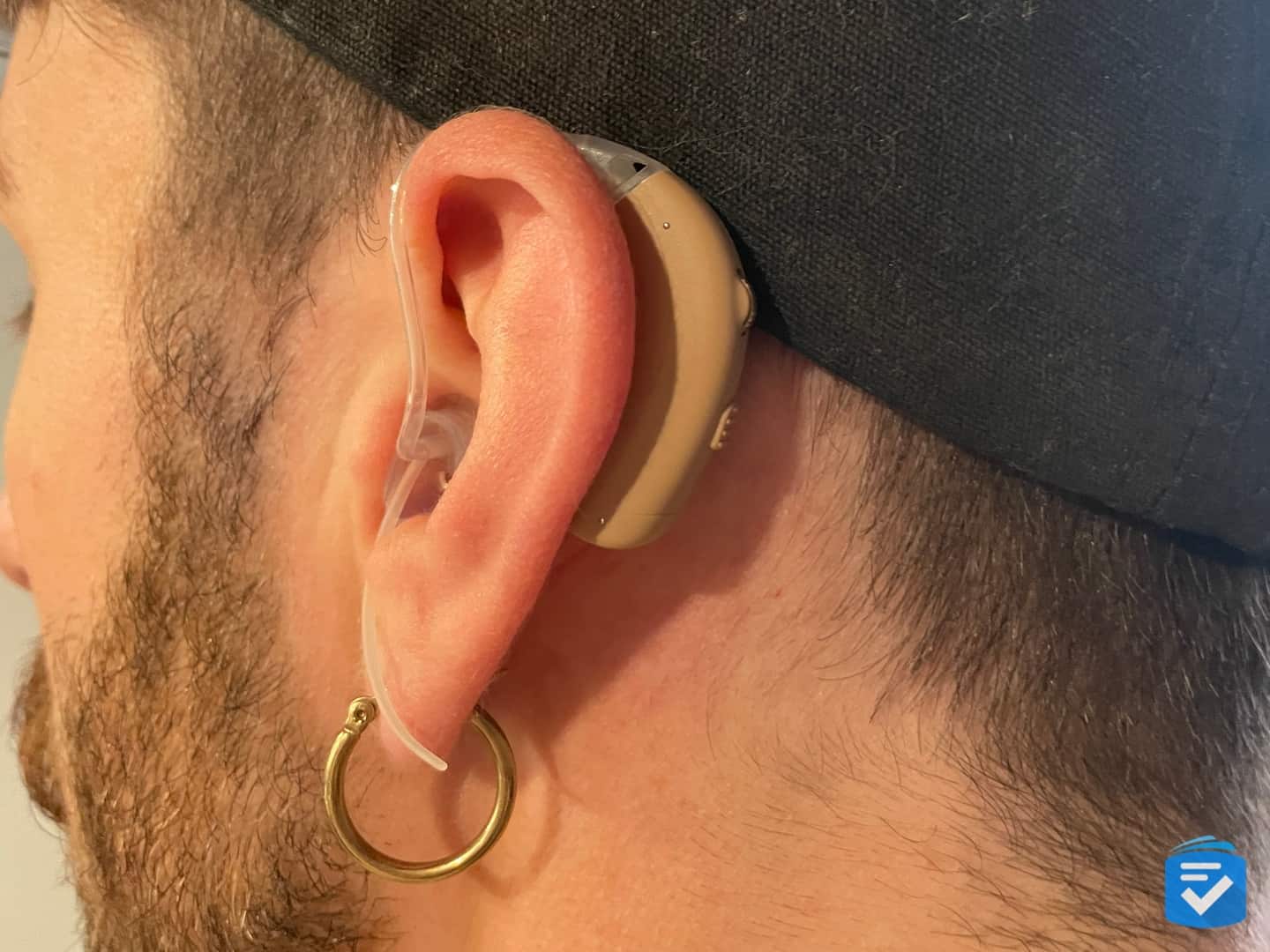
The one downside of MDHearing — and this applies to all of its models — would have to be the lack of hearing specialist support. While its customer care team is courteous and helpful, it isn’t able to offer the specialized support of an audiologist.
To learn more about MDHearing and its other models, read our MDHearing review and guide to MDHearing costs.
Pros
- 45-day risk-free trial
- Affordable, medical-grade devices
- FDA registered
- Easy online ordering
- Can be purchased in pairs or single
Cons
- No hearing specialist support
- No smartphone compatibility
Lexie B2 Plus - Bose Sound Quality
What We Like Most:
- Smartphone connectivity
- Great sound quality
- Under $1,000
- Ongoing support from hearing specialists
Overview
Cost: $999 per pair
After months of using Lexie B2 Plus hearing aids, one thing is clear: the company offers some of the best sound quality we’ve experienced with any hearing aid, regardless of price. This is likely due to the fact that Lexie B2 Plus hearing aids were created in partnership with Bose, a company widely known for its high-end speakers and headphones.
One of the biggest benefits of the Lexie B2 Plus hearing aids is that they’re self-fitting. This means that you can adjust them to your specific hearing needs without having to see an audiologist. The Lexie app makes it easy to do this, and it provides you with many settings to choose from.
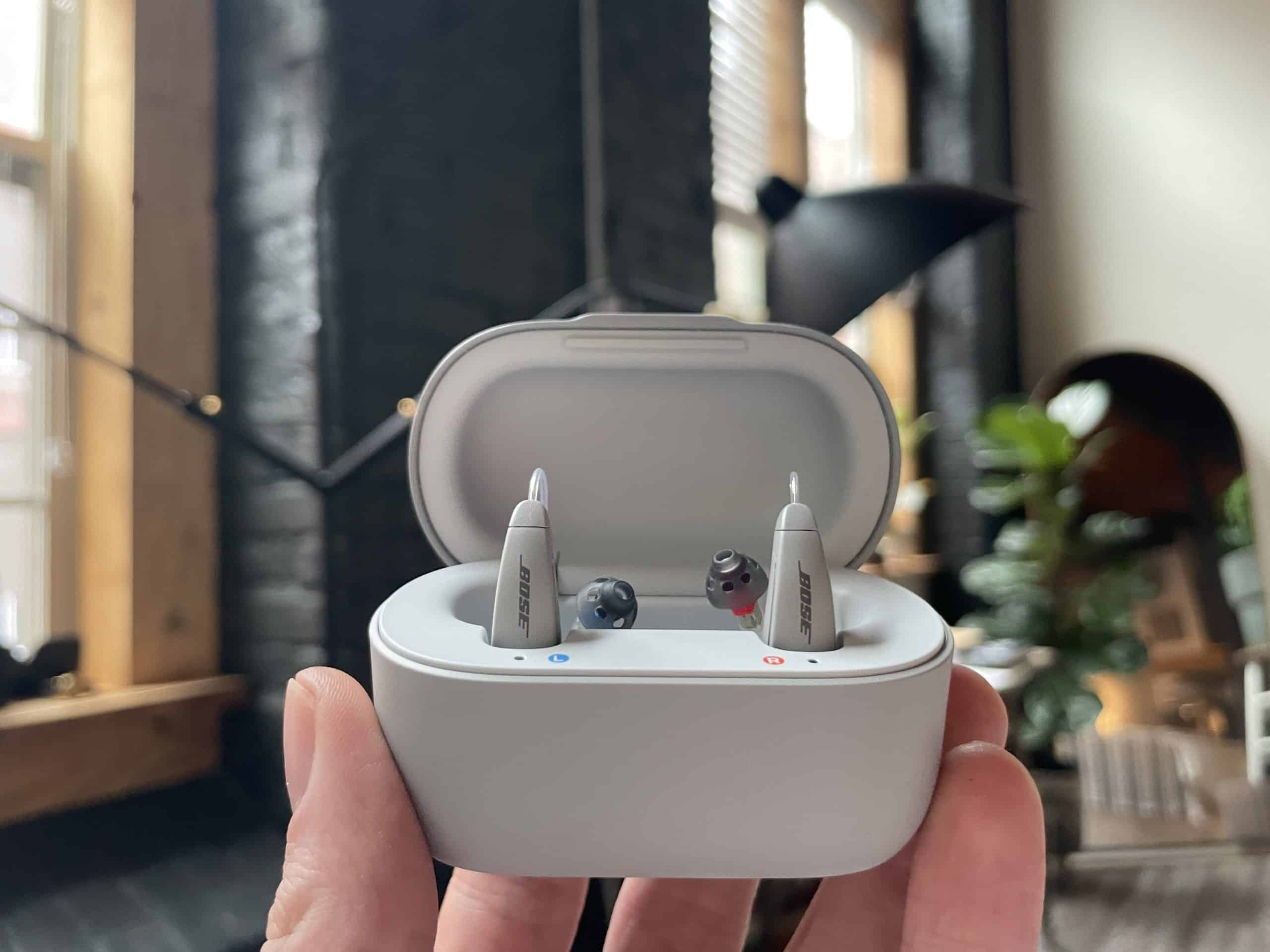
Another great benefit of the Lexie B2 Plus hearing aids is that they’re rechargeable. This means that you don’t have to worry about buying and replacing batteries all the time. A single charge lasts for up to 18 hours, which is plenty of time for most people.
I also found that in a variety of sound environments — from church to restaurants to watching TV in my living room — my Lexie hearing aids were able to adjust accordingly, allowing me to focus on the sounds I needed to hear. I could also stream calls via my iOS and Android devices using Bluetooth, which is a new feature not available on the previous model, the B2. However, the audio quality suffered when I tried to stream music or movies, unfortunately.
To learn more about our experience with these hearing aids, read our Lexie hearing aids review.
Pros
- Smartphone connectivity
- Crystal-clear sound quality
- Under $ 1,000 for a pair
- One-year warranty at no extra cost
Cons
- Poor streaming quality for music and media
- Only for people with mild-to-moderate hearing loss
Otofonix Revive - Best Bluetooth Capabilities

What We Like Most:
- Bluetooth streaming
- Rechargeable battery
- Background noise reduction
- 16-hour battery life
Overview
Cost: $1,590 per pair
One of the most frustrating aspects of hearing loss is not being able to hear the audio from a television show or movie, but that’s not a problem with the Otofonix Revive, which streams directly from Bluetooth. In our testing, we could stream the audio from our TV or phone through our hearing aids directly, all in a discreet, behind-the-ear design. And with over 16 hours of battery life, we could use the hearing aids all day without needing to recharge them.

Like any OTC hearing aids, the Revive pair from Otofonix only works with mild to moderate hearing loss. However, the company offers a 45-day trial, so you can try them out and see if they work for you. These headphones may be on the expensive side, regularly priced at $1,590, but look out for sales. As of writing in June, 2025, there is a 68 percent discount, bringing the price to only $499.
Pros
- Rechargeable
- Discreet design
- Bluetooth streaming
- Long battery life
Cons
- Expensive regular pricing
- Won’t work with severe or profound hearing loss
Costs of OTC Hearing Aids
One of the barriers to getting a high-quality hearing aid is the cost. Medicare does not cover hearing aids or exams, but some common health insurance programs may be able to help. Hearing aids run anywhere from $1,000 to $6,000 per device, so it’s easy to see how cost can be an issue even if a flexible payment plan is available.
Are OTC Hearing Aids Worth It?
Getting a professional hearing aid offers a lot of benefits, but OTC hearing aids may also be a good option. Buying over the counter is a way to reduce the cost of hearing aids and streamline the purchasing process. I recommend buying OTC hearing aids from a reputable company, such as those listed above, most of which offer some form of professional programming or support.
Pros and Cons of OTC Hearing Aids
OTC Hearing Aid Pros
- Affordability: OTC hearing aids are generally more affordable than hearing aids prescribed by a doctor, which can cost up to $6,000 per pair. OTC hearing aids often cost less than $1,000 per pair.
- Trial periods: To compensate for the lack of in-person fittings, most OTC hearing aid brands offer a trial period that is more than a month. Even if you’re nervous about purchasing hearing aids directly, you won’t have to worry about wasting your money.
- Accessibility: Companies such as Audicus, Eargo, and Jabra take the stress out of getting hearing aids fitted by offering free online hearing tests. There’s no need to book and attend multiple appointments, and you can get your devices in days.
- FDA-approved: As of October 17, 2022, the Food and Drug Administration (FDA) has approved OTC hearing aids for adults with mild to moderate hearing loss.2
OTC Hearing Aid Cons
- Fine-tuning: Rather than being personally molded to your ear, OTC hearing aids are a one-size-fits-all solution. They may not be as comfortable, depending on the size and shape of your ears.
- Lack of support: You may not receive the same level of support, and you’ll be on your own for choosing a model that suits your hearing loss. With OTC hearing aids, you may not get 24/7 support to ensure the option you choose is the right one.
- Spotty warranties: You may not get the same warranty or guarantee as with a traditional hearing aid company, although, in recent years, many OTC hearing aid companies have stepped up their game with longer warranties.
- Quality: OTC hearing aids may not be the quality you need. Hearing aids are not only for making sounds louder, but also for honing in on the sounds you need to hear and diminishing background noise, as well as withstanding daily use, dust, wax, and moisture.
Should You Buy Hearing Aids From Amazon?
A quick search of Amazon will yield many results for hearing aids. Most are low-cost hearing amplifiers that run in the $200 to $400 range. You often get what you pay for in these situations, so we’d advise you to proceed with caution with these devices. You likely won’t get the support you get with Eargo, MDHearingAid, and other reputable companies, and you may not get the same warranties.
Many of these devices don’t have any “smart” programming, and they’ll simply amplify whatever sound is there. These fall into the category of “something is better than nothing,” but we recommend going with a reputable company that offers some level of support and a warranty. You’ll also be able to try the devices before you fully commit.
Bottom Line
Buying OTC hearing aids can cut the cost and hassle of getting the hearing support you need. If you need hearing aids right away, then you can make an easy purchase after doing an online hearing test. Hearing aid providers such as Eargo and Audicus offer innovative, high-quality hearing aids at a lower cost than many other providers and with quick and friendly customer service. Many leading hearing aid manufacturers offer some form of risk-free trial and BOGO incentives for additional hearing aids, so there’s little reason not to try one today.
Our Methodology
Hearing aids are complicated and expensive devices, so we looked for the following characteristics in each company:
- Warranties: Compared to traditional prescription hearing aids, OTC hearing aids are often made by less-trusted brands, so we looked for hearing aids that offered at least a one-year warranty.
- Trial periods: Since no two types of hearing loss are precisely the same, not every hearing aid will work for everyone. I included only hearing aids with a lengthy trial period so you can return them and get your money back if they don’t work for you.
- Customer support: With prescription hearing aids, an audiologist or hearing health specialist will help tune them to your particular hearing loss. As such, we gave extra points to companies that provide remote support for their hearing aids.
- Sound performance: It should go without saying that hearing aids should provide a stellar audio performance. All the hearing aids on this list produce a natural sound with little to no distortion.
- Battery life: Whether a hearing aid uses disposable or rechargeable batteries, it will need to last a long time to ensure your hearing doesn’t cut out in the middle of the day.
Trying to figure out which hearing aid is right for you? Check out our Hearing Aid Buying Guide.
Frequently Asked Questions
-
How much are OTC hearing aids?
On average, OTC hearing aids cost significantly less than prescription hearing aids. OTC hearing aids typically range from $300 to $2,950.
-
Are OTC hearing aids available now?
Yes. You can buy certain OTC hearing aids without a prescription or visit to an audiologist. These products can be purchased either online or in stores like CVS and Best Buy.
-
How can I hear better without hearing aids?
If you have hearing loss, then there probably isn’t a way to hear better without hearing aids. Hearing aids can help improve your quality of life and help you hear clearly.
-
Do I need a prescription to get hearing aids?
No. Many hearing aid providers offer a free online hearing test to match you with the right hearing aids, but the FDA recommends seeing a doctor before purchasing hearing aids.
-
How can I restore my hearing naturally?
Most hearing loss is not reversible. There is some speculation that yoga, taking supplements and vitamins, and certain types of essential oils, such as cajeput essential oil, can help restore hearing naturally, but none of these is supported by current research. If you think you have treatable hearing loss, then you should consult your physician.




